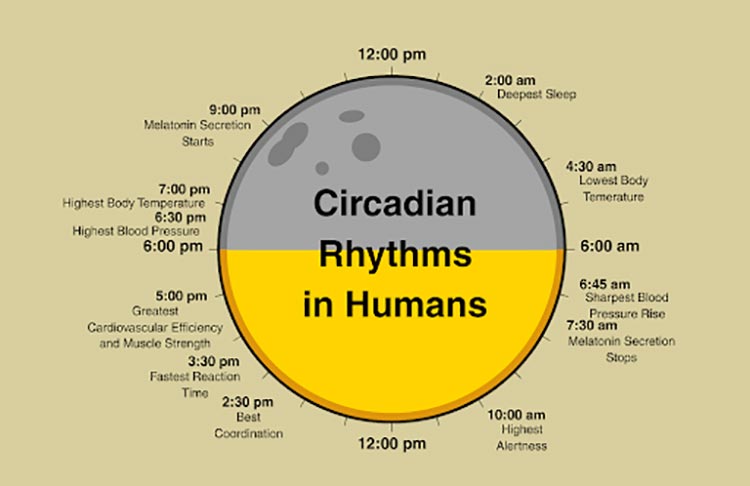Your circadian rhythm is the 24-hour internal clock that’s constantly running in your brain’s background. Throughout the day, you’ll feel dips and rises in your circadian rhythm. For many people, this happens in the middle of the night, but for night owls, it might happen in the morning. A small portion of your hypothalamus is responsible for your circadian rhythm, and this is called your SCN. But not many people realize how important their circadian rhythm is and how it affects their overall health. Here’s what you need to know:

Circadian Rhythm & Routine
Routine is the lifeline of your brain’s circadian rhythm. When things happen that disrupt a regular routine, your rhythm is thrown off balance. For example, if you take a long flight, you might experience jet lag. Planes travel so fast and far that they leave your body’s rhythm behind and disrupts the internal clock. Daylight savings time, having an infant with a sporadic sleep schedule in the home, and other instances like late night sporting events also have an impact on your rhythm. However, preventative measures are best. Here are some tips for getting a good night’s sleep.
How Light Affects Your Circadian Rhythm
The presence of light can have a major impact on your circadian rhythm. When there isn’t any light present, your eyes send a signal to your brain that it’s time to get tired. The brain responds by signaling the body to release melatonin. Because of this, most circadian rhythms are synced with day and night time.
Our bodies rely so heavily on light and darkness to signal what we should do next that it makes sense when you consider areas of the world where certain times of the year are dark or light throughout the day.
For instance, during Midnight Sun in Norway, people are more likely to be up later, doing more activities throughout the day, whereas when it’s completely dark during the winter, they are more likely to feel drained and stagnant.
Get the Right Mattress
What you sleep on makes all the difference. If you’re not comfortable when you go to sleep, it will be difficult to develop and maintain a healthy sleep routine. Fortunately, there are modern mattresses designed to cater to certain types of sleepers. For example, if you’re a hot sleeper, you might be better off with a cooling mattress. If you’re a side sleeper, you might want a softer mattress. Being comfortable throughout the night promotes healthy sleep and will help you get the desired and effective amount of rest. Check out this mattress guide for more details.
It Affects Your Health
An imbalanced circadian rhythm will affect other areas of your health. A disturbance in your biological clock increases your risk of anxiety, diabetes, high blood pressure, and cancer. For example, because your body’s process of storing food in the body is complex and particular, you are at a higher risk of diabetes when your clock is off.
“Because we eat during the day, insulin should be produced during the day and glucose at night; everything has to be done at the right time,” said Noga Kronfeld-Schor, chair of the Tel Aviv University School of Zoology and head of its Ecological and Evolutionary Physiology Laboratory. “If you disrupt or de-synch the clock by working night shifts or eating at night it disrupts that homeostasis.”
How to Get Your Circadian Rhythm on Track
If for whatever reason you feel as though your body’s internal clock is thrown off, there are certain things you can do to get back on track. For starters, because light does have an impact on your rhythm, you can manipulate lighting to achieve what you’d like. For example, if you’re experiencing jet lag and travel in a time zone with a six hour difference from you, you might need to get light between 3pm and 9am if you were traveling east.
A free app called Entrain will help you set up a light/dark schedule completely tailored to you. Spending time outdoors also helps restore natural cycles, so you might consider camping overnight or going for a lengthy hike. And lastly, refrain from longer naps throughout the day. Power naps are okay, but long naps impact your circadian rhythm and make it difficult to sleep at night.















